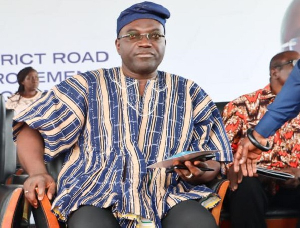This is a rejoinder to “Making Respect For Our Moral Values A Priority” (Ghanaweb, 5 October 2007), by Mr. Richard Obeng Mensah. The rejoinder is meant more as a critique of the “new” Ministry of Information and National Orientation’s “five pillars of national orientation,” than as a critique of Mr. Richard Obeng Mensah’s piece. Nonetheless, there are parallel lessons.
If we recognize that “lawlessness has been the blight to our fast advancement as a nation since our treasured independence in 1957,” how does one solve the problems of “lawlessness” by adopting and chanting the five pillars for “new paths for national development,” one of which is “Discipline?:
1. Proud to be Ghanaian
2. Patriotism and a Spirit of Ghana First
3. A Can-Do-It Attitude
4. Productivity and Accountability
5. Dedication and Discipline.
Seems to me these are smoking mirrors, a sign of deluded thinking even, a gross denial of the more important things, and attempts to whip up emotions of the people in all the wrong places. Can the person who conceptualized these so-called five “pillars” of development tell us with a straight face why “Patriotism” is not the same as “Proud to Be Ghanaian,” which itself encompasses “a Spirit of Ghana First.” And why is it so important that “Productivity” and “Accountability” must be linked, with a conjunctive? Can the person explain why is it that she/he failed to realize that “Accountability” is the primary key here, and the other redundant?
Yes, “Accountability,” as in providing the media and the people timely, accurate, and complete information about government expenditures, government performance; telling the people where the president was during the 7-odds days of September and how much it cost the nation; rendering a complete account of the Ghana at 50 expenditures; passing the Freedom of Information Bill, providing account of the Asset Declaration Law program, etc.). Yes, that is “Accountability.” Produce all you want and try convincing even elementary school youths that you cannot/will not account for any thing but they should trust you that you are getting some where with them.
Smoking mirrors, I say!!
Next, one should ask whatever happened to “Zero Tolerance for Corruption”? Why is it that it is not one of the pillars for “national development”? Does the government assume that everyone (including the media) have been successfully deluded into thinking that “Perception of Corruption” is not actionable by a government? Not so fast! I submit to the government that there is an important public policy interest in controlling even the “Perception of Corruption” in any society worth living in. Further, no lawyer or public administrator worthy of his/her degree and professional reputation believes that “corruption is perception” nonsense, either. The other question becomes how a nation believe it is in fact developing and making the right choices if a vast segment of the people thinks the government is perceived as corrupt and that whatever it says is “rubbish”?
Yes, smoking mirrors, that is what they are, those five pillars for so-called “new paths for national development.” The pillars are self-repeating and they are mostly irrelevant to a Ghana-centered development agenda. If one agrees that “most of our law enforcement agencies are compromising,” and that “Perhaps, such leaders are guilty themselves,” why not call a spade a spade? Can anyone explain why the people should rely on the same leaders to “prioritise respect for moral values and good societal standards above all policies…” if they themselves may be guilty and are not inclined to change their ways and lead by example?
It does not make sense in a democracy to say that “indiscipline is our major challenge.” Lawlessness is not the same as problems of “indiscipline." Democracies do not attack legal, social, and cultural problems by labeling them as “Indiscipline” problems. “Indiscipline” only serves the autocrat, the bully, the male chauvinist, the person with religion and a document on their chest, the person making all the decisions who does not want anyone to know what that person is doing, the person who is himself/herself a discipline problem.
The issue here is not “indiscipline.” It is useless to attempt to articulate public policies to something called “indiscipline,” and “productivity,” for that matter. With respect to the latter, many people believe that Ghana produces enough, but that more than enough is squandered at the top. Moreover, for the most part, “Productivity” belongs to the private domain. One would have thought that for a government that sees itself as a champion of private business empowerment and empowerment of the people, that they would know the difference.
THE REAL CONUNDRUM:
That said, the real problems have everything to do with enforcement of existing laws, compliance with administrative rules and regulations, and institutionalization of mechanisms to effect government accountability and transparency. Where in the scheme of all the government’s development and administrative priorities does the Ghana Police, the CID, SFO, CHRAJ, and the Attorney General stand with respect to resources, independence, and the focus for arresting corruption in Ghana? Isn’t that what is important and ought to be at bottom of the “new paths for national development”? I think so. That is where public policies, programs, and support ought to be directed to fast track the Ghana development enterprise, if the administration is interested in not wasting the peoples’ time, resources, and patience.
ITEM: By the way, Prof Lungu believes that the so-called five pillars of the new development agenda can all be subsumed under one mantra, “Ghana-Proud.” In that sense, one is not proud of Ghana or patriotic if one is a corrupt public official.”



















